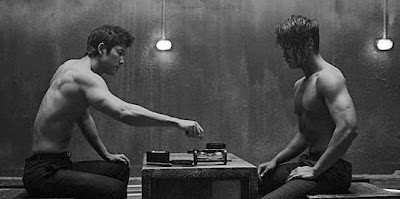
Review No. 1:
Ours is a jaded age. We've read and re-appropriated de Sade and von Sacher-Masoch. We've been revolted by then revered Bad Lieutenant, Salo, and the entire Saw franchise. We've censored Mapplethorpe and Serrano photos only to institutionalize them later. In that context, there's something almost quaint about Lies, a Korean doomed BDSM romance about a sculptor (Lee Sang-hyun) and a high school student (Kim Tae-yeon) half his age. Is Jang Sun-woo's Lolita scenario intended to shock us? Are we supposed to get upset or outraged by dialogue that has to do with spankings, eating shit, and underage phone sex? Does the casting of non-actors and the use of a handheld camera speak to authenticity or budgetary constraints? Visually tame (with a glimpse of a man's butt and little else), Lies is a potty-mouthed representation of a cinematic cliche: a sexual fantasy involving a middle-aged man and a young woman barely out of puberty. Snooze.
Review No. 2:
I should've suspected something was up given the 52-minute running time. Too long for a short and too short for a feature, Amazon Prime's version of Lies struck me as an oddity. In truth, it was a false representation! This streaming aberration of what is actually a graphic depiction of a BDSM relationship has excised 20 minutes of welts, bruises, skat and God knows what else. Do the explicit sections add up to a totally different experience? Likely so. Am I sorry I didn't get to see the uncut version? Well, yes and no. I'm definitely a bit annoyed that Amazon Prime is serving up an abridged version — of a movie that's garnered a few international honors — without labeling it as such. Then again, having seen Bad Lieutenant, Salo, a few Saw flicks, and more than my share of torture porn (Egads, how I hate that I ever saw The Butcher), I'm kind of relieved that my memories don't now include snippets from a dirty art film showcasing asses being tendered by sticks, leather straps, and wires. Relieved. But not thankful. False advertising may be our culture's dirtiest crime, after all.














